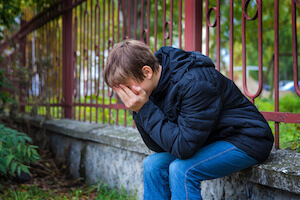Globally, sex trafficking may exploit as many as 4.5 million people. In 2016, the National Center for Missing & Exploited Children estimated that 1 in 6 endangered runaways reported to them were likely sex trafficking victims. This is an epidemic, and it’s closer than you think.
Several years ago I had a troubling experience that stays with me to this day.
I returned home from a vacation and collected my car from a privately owned parking lot just outside the airport. As I waited in the tired, soulless lobby for my keys I observed a young girl, age 12 or so, and a much younger girl with her. They looked exhausted, staring out the big picture window at the grey scene before them.
The older of the two girls was wearing fashionable, grown-up platform shoes and a revealing dress designed for a mature woman. None of it made sense to me: Where are the parents? Why is this child dressed like an adult? Who are the girls waiting for? Why are they so exhausted? Why here?
Where are their innocent, childlike smiles?
That scene has haunted me for several years now. My instinct told me something was amiss. But, I didn’t know what exactly. For some reason, I could logically explain away each concern: Kids like to play dress-up. Parents left to grab their car. They’re tired from traveling.
Mom-instinct told me otherwise.
The scene in the airport carpark came rushing back to me one day, as I attended a seminar about sex trafficking. Sitting among other school health educators and nurses, and listening to a wave of facts and statistics, that unsettling feeling returned.
What did I witness? Something completely innocent? Something disturbing?
Following the seminar, I contacted one of the presenters. When we talked more about sex trafficking, I realized how important, yet misunderstood a topic it was. Then, she shared with me some interesting and helpful information. But, because of the nature of her work, she requested anonymity. I wish I could go back to that carpark; particularly if I was right. Because now I know what to do.
In sex trafficking, vulnerable individuals are targeted due to their life situations. Victims may include:
- Young people who feel lonely or dismissed by parents. They may respond to a person who spends time with them and “respects” them.
- People who may be going through difficult personal situations such as a parental divorce. Children may not have appropriate support to handle the stressors associated with that life change.
- Homeless young people. They deal with a myriad of issues that make them vulnerable prey for sex trafficking.
- Girls who may have low self-esteem and are trying to find their place in the world.
- Individuals identifying as LGBTQ. According to the Polaris Project, the LGBTQ population is FIVE TIMES more likely to be targeted by traffickers. Why? Think about the struggle this population goes through to just have the same basic rights as straight citizens. Feeling marginalized, unwanted, isolated, and alone, this population is particularly vulnerable to these predators who swoop in to offer acceptance and community.
Sex trafficking predators look for targets in a variety of ways. They include:
- Social media like Facebook;
- through friends;
- as a result of contacts made with drug users;
- places people typically have their guard down, like malls, amusement parks, and gas stations.
How does one fall victim to sex trafficking?
- Some are physically forced or threatened;
- Others are victims of fraud and/or coercion. They may be promised clothes, drugs, or even love.
Talk with your children about internet safety and being and within the community.
- Help them understand why you want to have the conversation. You want them to be aware, not frightened.
- Approach the topic with logic and love, not anger.
- Stress how much you care for your child, are proud to be their mother or father, and just want them safe.
- Avoid blaming.
- Remind them that if they find themselves in scary situations, you are always there for them no matter what.
- Tell them it is okay to report any uncomfortable situation.
- Remind them to follow the little voice that says “bad idea.” It may not be very loud, but listen to the whisper.
- Ask open-ended questions. According to netsmartz.org, begin conversations with:
“What would you do if…”
“Has anyone ever…”
“Why and how might someone try to gain your trust?”
Teach online safety basics:
- Never give out personal information.
- Never share photos in private messages.
- Anything posted on social media is permanent.
- No sexting.
- Never accept a “friend” request from someone you do not know.
Be proactive parents.
- Use parental controls to regulate underage viewing habits;
- Confront your child if his or her browsing history includes sites like BackPage or Craigslist.
- Keep the conversations flowing.
- Set up family guidelines for internet use.
- Show interest in your child’s viewing habits.
- Report suspicious activity to the authorities without hesitation.
The best protection for your child to avoid falling victim to predators?
BE. THERE. FOR. THEM.
Be present and engaged.
You can’t be there all the time. However, if you dismiss your child with a 20-dollar bill and little supervision, you could be asking for trouble. Rather, use that money for a fun excursion with your child on a regular basis. Quarterly, monthly, weekly… it doesn’t matter as long as you use that time to connect. The bond you form during your dedicated time together will spill over into daily life as you navigate routine challenges. Not always, but enough. Your child wants your time.
Whether your children identifies as LGBTQ or straight, love and support them the same. Regardless if your children struggle or excel in school, they need your love and support. In times of personal struggle, particularly divorce or homelessness, reach out for social service help or counseling. Also, consider talking to your child’s school personnel. You’ll be amazed how effective it is to have trusted adults, even just one, especially within your child’s school community.
Kids need the adults in their lives to step up. If they don’t, they will find someone who will.
Sex trafficking is complex and multifaceted.
For the record, I an not an expert on sex trafficking. However, I realize anyone can encounter it. So, what should you do if you find yourself in a situation similar to my experience at the airport car lot?
Call 9-1-1.
Fortunately, local police agencies have been trained on what to look for. According to the anonymous law enforcement person I interviewed, you should simply state your observations and your location.
You can also call 1-800-843-5678 or go to www.cybertipline.org.
For more information, visit these OUTSTANDING and COMPREHENSIVE (NCMEC) sites for parents, educators, law enforcement personnel, and even teens.
netsmartz.org (Great for families, educators, and law enforcement professionals.)
Polaris Project.org (Information about legal issues and trafficking.)
National Human Trafficking Resource Center (NHTRC.org) (Great for educators.)
Missing Kids.org (The homepage for NCMEC.)





